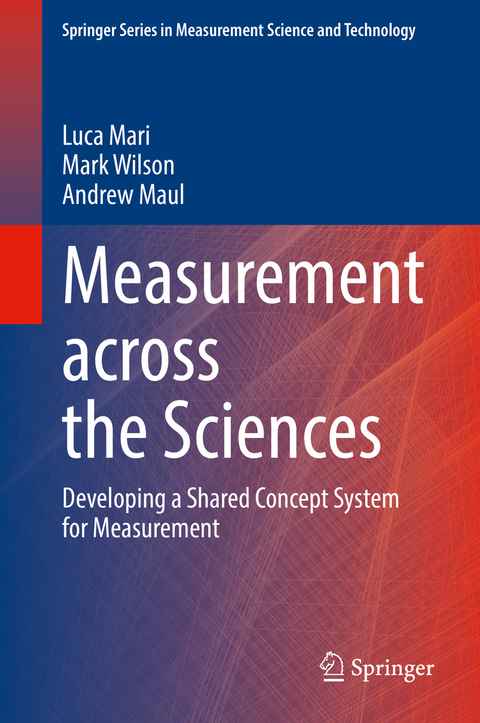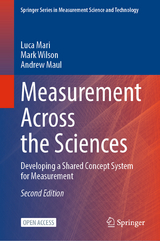
Measurement across the Sciences
Springer International Publishing (Verlag)
9783030655570 (ISBN)
- Titel ist leider vergriffen;
keine Neuauflage - Artikel merken
This book proposes a conceptual framework for understanding measurement across a broad range of scientific fields and areas of application, such as physics, engineering, education, and psychology. The authors, who themselves span these disciplines, argue that the justification of the public trust attributed to measurement results can in principle apply identically to both physical and psychosocial properties. They further argue that the lack of a common conceptualization of measurement hampers interdisciplinary communication and limits the ability to share knowledge. They advance their views by first surveying the conceptual history of the philosophy of measurement and arguing that classical, operationalist and representational perspectives on measurement each make important contributions but also each have important shortcomings. A synthesis is then offered as the foundation for a new conceptual framework. The authors describe how the framework, which operates as a shared concept system, supports understanding measurement's work in different domains, using examples in the physical and human sciences. They consider connections and consequences with respect to causality, objectivity, and intersubjectivity, among other topics, and how measurement science concepts and issues are construed across these disciplines and settings. They also address contemporary issues and controversies within measurement in the light of the framework, including operationalism, definitional uncertainty, and the relations between measurement and computation. The book concludes with a justification for the basic claim that measurement is an empirical and informational process that produces explicitly justifiable information.
Researchers and academics across a wide range of disciplines including biological, physical, social and behavioral scientists, as well as specialists in measurement and philosophy will appreciate the work's fresh and provocative approach to the field at a time when sound measurements of complex scientific systems are increasingly essential to solving critical global problems.lt;p>Luca Mari is a professor of Measurement Science at Università Carlo Cattaneo - LIUC, Castellanza, Italy, where he teaches courses on measurement science, statistical data analysis, and systems theory. Internationally, he is chair of the TC 1 (Terminology) and the secretary of the TC 25 (Quantities and units) of the International Electrotechnical Commission (IEC), and an IEC expert in the WG2 (VIM) of the Joint Committee for Guides in Metrology (JCGM). In Italy, he chairs the Technical Committee CEI 1/25 "Terminologia, grandezze e unità" of the Comitato Elettrotecnico Italiano (CEI) and is chair of the Technical Commission UNI-CEI 500 "Metrologia". His research activities focus on fundamental topics of measurement science and its relations to information science and technology, systems theory, information systems, and eLearning. Dr. Mari received the Ph.D. from the Polytechnic of Torino, Italy in 1994.
Mark Wilson is a professor of Education at the University of California, Berkeley, and also at the University of Melbourne. His interests focus on measurement and applied statistics, and he has published over 100 refereed articles in those areas, and over 50 invited chapters. He was elected president of the Psychometric Society, also of the US National Council for Measurement in Education (NCME). He is also a Member of the US National Academy of Education, a Fellow of the American Educational Research Association, and a National Associate of the US National Research Council. He is Director of the Berkeley Evaluation and Assessment Research (BEAR) Center. His research interests focus on the development and application of sound approaches for measurement in education and the human sciences, the development of statistical models suitable for measurement contexts, the creation of instruments to measure new constructs, and scholarship on the philosophy of measurement. Dr. Wilson received his PhD degree from the University of Chicago in 1984.
Andrew Maul is a professor of Education at the University of California, Santa Barbara. His work integrates lines of inquiry traditionally associated with statistics, philosophy, psychology, and history, with the aim of improving the quality of methodological practices in the human sciences, and in particular the theory and practice of measurement. Dr. Maul received his Ph.D. in 2008 from the University of California, Berkeley. He regularly teaches courses on the construction and validation of measuring instruments, item response theory, and the philosophy of measurement, as well as introductory and advanced research methods and applied statistics.
Part I: Introduction
Chapter 1: Motivation
Measurement across the sciences
What constitutes "good" measurement?
Developing a common vocabulary
Chapter 2: Basic concepts in measurementA black-box characterization of measurement
Vocabulary for measurement
The goals of measurement
Measurement uncertaintyChapter 3: History of measurement
A brief history of measurement in the physical sciences
A brief history of measurement in the social sciences
Chapter 4: A historical overview of philosophical perspectives on measurementOperationalist perspectives
Representational perspectives
Pragmatist perspectives
Realist perspectives
Points of agreement, disagreement, and incommensurability
Part II: A new integrated concept system for measurement
Chapter 5: A meta-structural understanding of measurement
Model-based approaches to measurement
A structured methodology for measurement developmentChapter 6: An epistemology of measurement
Measurement in the context of general theories of epistemology
A pragmatist-realist perspective on measurement
Objectivity and (inter)subjectivity
How does one justify the dependability of a measurement?
Chapter 7: Measurand definitions and definitional uncertainty
Defining measurands
Examples of definitional uncertainty from various domains
The historical importance of definitional uncertainty
A pragmatic realist approach to definitional uncertainty
Chapter 8: Measurement across the sciences
Measurement of physical propertiesMeasurement of psychological properties
Measurement of societal properties
Comparing measurement concepts and issues across contexts
Part III: Controversies and Issues
Chapter 9: Measurement in psychology: the legacy of operationalism
An example of contemporary measurement practice in psychology
The advantages of operationalism
The disadvantages of operationalismMoving a discipline beyond operationalism
Chapter 10: Big data
A brief description of big data and data analytics
Critique of data analytics from a measurement point of viewEmpirical example
Chapter 11: The role of human beings within measurement
The roles of different actors/subjects who design and/or interact with the measurement system
A pragmatic-realist approach to feedback loops and interactions
Chapter 12: Scaling
Types of property evaluationQuantities and quantification
Classification and measurement
Part IV: Conclusion
Chapter 13: Prospects for the future
Measurement across complex networks of actorsMeasurement in industry, commerce, and society
The role of measurement in science.
| Erscheinungsdatum | 30.03.2021 |
|---|---|
| Reihe/Serie | Springer Series in Measurement Science and Technology |
| Zusatzinfo | XXXV, 279 p. 72 illus., 64 illus. in color. |
| Verlagsort | Cham |
| Sprache | englisch |
| Maße | 155 x 235 mm |
| Gewicht | 686 g |
| Themenwelt | Mathematik / Informatik ► Informatik ► Theorie / Studium |
| Naturwissenschaften ► Physik / Astronomie | |
| Sozialwissenschaften ► Soziologie ► Empirische Sozialforschung | |
| Schlagworte | Data-driven Science, Modeling and Theory Building • open access • Performance Management • Performance Measurement • Philosophy of measurement • Physical and mental measurement • Physical and non-physical measurment • Physical and Social Measurement • Psychometrics |
| ISBN-13 | 9783030655570 / 9783030655570 |
| Zustand | Neuware |
| Informationen gemäß Produktsicherheitsverordnung (GPSR) | |
| Haben Sie eine Frage zum Produkt? |
aus dem Bereich



